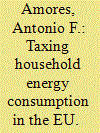| Srl | Item |
| 1 |
ID:
111317


|
|
|
|
|
| Publication |
2012.
|
| Summary/Abstract |
This paper1 takes as its starting point the observation that fuel prices - and thus taxes - are important for good management of climate change and other environmental problems. To economists this should be no surprise yet it seems that the role of fuel taxation as an instrument of climate policy has not been fully appreciated. It is however one of the few policy instruments that, since several decades, has actually reduced fuel consumption appreciably. Thanks to taxation (mainly in Europe and Japan), carbon emissions are considerably lower than they would have been otherwise. In future where carbon emissions are to be cut drastically, this instrument will be crucial. There is however much opposition to the instrument. This opposition uses various arguments, for instance that fuel taxes hurt the poor since they are strongly regressive. We however find that the choice of country and methodology turns out to be of great consequence. We study seven European countries-France, Germany, United Kingdom, Italy, Serbia, Spain and Sweden and do find some evidence of regressivity but the evidence is very weak. It does not apply when lifetime income is used and it does not apply to the poorest country in the group. The best one-line summary is probably that the tax is approximately proportional.
|
|
|
|
|
|
|
|
|
|
|
|
|
|
|
|
| 2 |
ID:
191412


|
|
|
|
|
| Summary/Abstract |
The taxation of energy consumption is a central topic in current policy debate in the European Union. While raising energy taxation is part of the European Commission’s strategy for achieving its climate targets for 2030 and 2050, the ongoing dramatic increases in the price of energy products are resulting in calls to reduce taxation on them. Therefore, it is crucial to closely consider the tax burden and redistributive effects of energy taxation in order to design compensatory measures and ensure support for the green transition. In this paper, we use the EUROMOD microsimulation model to estimate the burden and the redistributive impact of energy consumption taxation on households across Member States. In doing so, we break down the roles played by differences in consumption patterns, rates of taxation (covering both excises and VAT) and their regressivity. Countries with the highest energy taxation are often not those where its tax burden on household income is the strongest. At the same time, the strongest redistributive impact is not always taking place in countries with the most regressive energy taxation.
|
|
|
|
|
|
|
|
|
|
|
|
|
|
|
|